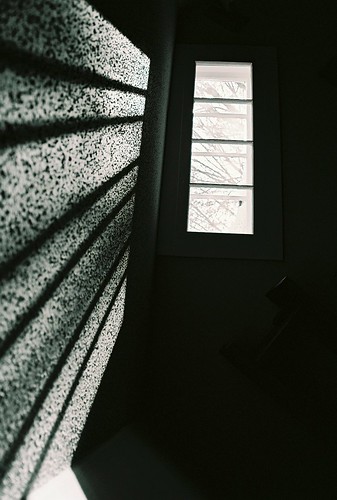notes from "Philosophy of Artistic Activity," Wednesday, November 22, 2006, Br. Nathan Cromly
Question: isn't there a distinction between work and art?
Response: though they are not the same, they are not distinctly different.
Work : Art
Work: associated with toil, labor, and utility. It transforms matter towards usefulness, towards means, towards a tool (you dig a ditch: the ditch is a tool. The cheese knife is beautiful in this light, but it was made for cheese).
Art: associated with beauty, aesthetics, is an end in itself. It is contemplative in the sense that it is made for itself. Its transformative action, is expressive.
But both work and art are transformative, both have an acting subject that transforms the material world towards order, unification. Both engage with physicality.
So perhaps another question might be: what's the use of beauty? (i.e. against the building of an ugly church--towards utility, against beauty and therefore costs, and towards a desire to give money to the community's poor instead--the people said, "we need beauty as much as we need bread.")
The purpose of a work of art is to remind us of our humanity--it is contemplative (my aside: note the language--work of art).
(?) Not a question of aesthetics, merely, but a question about who we are in work and art. Almost all work contains something sacred in it, even the mundane reflects practical intelligence, which reflects the human quest for God.
Question: I once heard Father Philippe (?) say: all art is based on relations, subjective or not, and that relationship can be either real or ideal, but art is not creative in being. . . ?
God : Artist
God: from being, substance. God creates, actuates, out of nothing.
Artist: like God in creating but only by way of analogy. The artist in likeness makes, creates, but begins with something, matter that combines certain pre-existing qualities, conditions. She works on relation (my aside: contingencies) to create a unity.
How does the artist work?
inspiration (informed by the artist's successive affectivity, psychology, memory, education) -> ideas
ideas are both ->
1) possible: not yet existing and something that is new. Renovare: renewing. Ideal. Subjective.
2) project: accomplishable, can be done in reality, taking into consideration Consevare: the already given of the past. Real. Objective.
The subjective may not lead to the real towards truth or humanity. (my aside: subjective art might remain too fully invested in the artist's affectivity, psychology, memory, education, etc. and not invest or engage enough in the givens of the past or the determination. Glass houses, i.e., may not be raised up six miles into the sky, much as we want glass houses.)
I.e. a marble pieta speaks in marble: in matter, through the matter: matter itself reveals the vision of the artist. The artist discovers in the medium what is available towards expression. The sculptor looks to the slab's relations for what it might become, reveal. For: how does art reveal truth?
Brother Nathan (they said), "there is no truth. There is no truth."
But the artist (according to Schopenhauer?) is a prophet--and the prophet points out to people what they don't see. So the musician in the subway, i.e., who fills the tunnel's cacophony with music takes away a lot of the sensible qualities to bring about a harmony.
The artist as prophet, allowing the determining factors, also allows the weakening of inspiration, necessarily. But art isn't about inspiration, but about realization. Consevare: genre.
Inspiration is by its very nature the source of possibles (my aside: against genre).
And parsing possibles:
possibilities -> new order (intelligence seizes something new) + affectivity (the will to create) and passion (pleasure or not). "When we get an idea it is always connected to our will."
But inspiration leads to ideas wherein we arrive at choice: from a diversity of options, the one thing to express.
The distinction between inspiration and choice is the difference between the many and the one: how do I pass from the many to the one?
Many -> One
between them:
1) will: in the idea there is imperium, comand of will, a force of seduction, passion, possessing me.
2) intelligence: there is the past, culture, matter to consider also.
--Well but as soon as you have an idea, it imposes itself on you--
So a good question, a good paper, might address the question: how does Grace sanctify that impulse?
Charity.
If I have an idea, it is for you, sister.
The artist needs to become a servant, not a queen or king.
***
